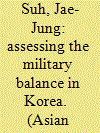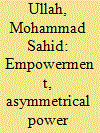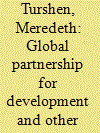| Srl | Item |
| 1 |
ID:
059910


|
|
|
| 2 |
ID:
127513


|
|
|
|
|
| Publication |
2014.
|
| Summary/Abstract |
This article examines the matrix of Israel's urban interventions using territorial and demographic engineering to transform Jerusalem into a closer approximation of Zionist ideological conceptualization. It argues that the state deploys archaeological, cultural, sociopolitical, territorial, and urban design instruments to deconstruct or re-narrate the other histories and characteristics of the city in order to preempt alternative sovereignties. The asymmetrical power of the Israeli state is constantly challenged in urban spaces and quotidian practices by Palestinians who hold competing discourses. Palestinians contest Israel's conceptualization through discourses that do not ascribe to the state project, emphasizing that identity is not exclusive to one ethnicity or religion, while working to sustain and strengthen an alternative sovereignty.
|
|
|
|
|
|
|
|
|
|
|
|
|
|
|
|
| 3 |
ID:
156529


|
|
|
|
|
| Summary/Abstract |
In the wider context of growing digitalisation in South Asia, this article examines the impacts of a public–private–people partnership (4Ps) information and communication technology (ICT) initiative of the Bangladesh government, administered through local governmental offices, the Union Information Service Centre (UISC). Scrutinising the operation of six UISCs in rural communities across Bangladesh, the study researches the potential of ICTs to influence existing asymmetrical power relations and empower local people. Asking to what extent ICTs enable more people to actively participate in their communities and what the implications for empowerment are, it is found that top-down ICT intervention by itself cannot bring substantial change for people at the bottom of the social pyramid. Asymmetrical power relations continue to deprive marginalised groups from receiving the claimed benefits of ICT facilities. The study suggests the need for a more critical, practice-focused understanding of relationships between ICTs and rural empowerment, while also highlighting the changing modalities of connecting states and their citizens in postmodern South Asia.
|
|
|
|
|
|
|
|
|
|
|
|
|
|
|
|
| 4 |
ID:
131350


|
|
|
|
|
| Publication |
2014.
|
| Summary/Abstract |
This article revisits the United Nations Millennium Development Goals (mdgs) set in 2000, timely now because policy makers are currently making plans for the period after 2015. After laying out a critical analysis of the mdgs, the article focuses on Millennium Goal 8, the global partnership for development. The argument made is that the absence of any goal to reset the asymmetrical power relations between the North and the South reveals the limitations of the endeavour. The pharmaceutical industry is discussed in detail because mdg8/Target 6 deals with access to affordable, essential drugs in developing countries. This target seems emblematic of a problem found throughout the millennium project: the unaddressed need for real economic development. Target 6 exemplifies both North-South and public-private conflicts of interest, which are carefully hidden in official documents behind the euphemism of 'partnership', as if countries of such unequal power could be partners.
|
|
|
|
|
|
|
|
|
|
|
|
|
|
|
|